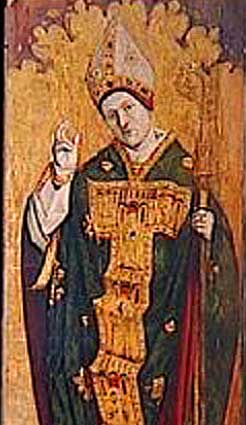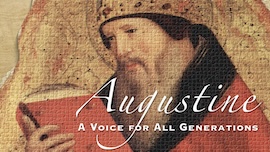The Church Held a Council in Orange about GRACE

[Caesarius of Arles. Césaire d'Arles, archevêque d'Arles et primat des Gaules, retable de la cathédrale Saint-Siffrein de Carpentras—anonymous / Wikimedia]
CHRISTIANS AGREE that salvation is a marvelous, miraculous gift of God's grace, but still can disagree in their understanding in the mysterious working of that grace.
One hundred years after Pelagius and Augustine tussled over the theology of free will and grace, the issues they raised still had not been satisfactorily resolved. Pelagius had argued that man’s freedom of will was unaffected by Adam’s fall into sin. Augustine took a strong opposite position in which humans have essentially no freedom at all. (Luther and Calvin would follow Augustine in this.)
Early in the sixth century, a controversy erupted in Gaul (France) between semi-Pelagians (those who held a modified Pelagian view that allowed human freedom to accept God’s salvation without assistance from God’s grace) and the extreme Augustinians (who, in effect, made people into puppets of God). It reached such a crisis that Pope Felix IV sent some theological statements for the bishops in Gaul to consider. On this day, 3 July 529, fourteen bishops met at the dedication of a new church at Orange. Bishop Caesarius of Arles presided over their discussions.
At its conclusion the council issued twenty-five canons (pronouncements). Eighteen months later, Pope Boniface II approved the canons, making them official Catholic doctrine. The Council of Orange supported the Augustinian position on grace. Without God’s grace, people would not seek salvation nor have any desire or ability to do true good. However, the council also declared that human freedom of will, while weakened, had not been completely destroyed. It avoided Augustine’s controversial positions on election and predestination, saying in its concluding statement:
All baptized Christians may, through grace, if they will only labor faithfully, accomplish those things which appertain to salvation; and that the doctrine of God’s predestination of some certain individuals to evil is, not only to be disbelieved, but also to be anathematized with all detestation.
Because it did not support Augustine’s most controversial theology, the council is sometimes called semi-Augustinian (or semi-Pelagian). Both Calvinists and Arminians point back to it as supporting their positions.
Concerning the controversy over Augustine it should be noted that when he first advanced his understanding of predestination and election, Christians (especially St. Hillary of Poiiers) challenged him to demonstrate from the church fathers that his theology was not a new teaching. Augustine, who had earlier said he discovered his teaching himself, was able to give only three weak examples, all from recent theologians. Therefore some of Augustine’s positions were almost as controversial as Pelagius’s.
While the Synod of Orange settled issues regarding grace and free will, and may have rejected the doctrine of reprobation, it did not settle the issues of election, predestination, and reprobation; they continue centuries later to cause controversy among Christians.
—Dan Graves
----- ----- -----
As our story indicates, Augustine has been one of the most influential theologians in Western Christendom. Watch his story, Augustine: A Voice for All Generations, at RedeemTV.
Augustine: A Voice for All Generations can be purchased at Vision Video.







